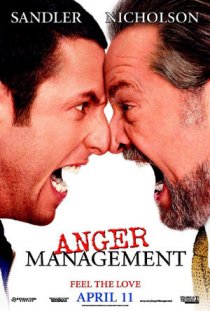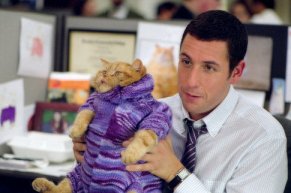|
Anger
Management
The combination
of Jack Nicholson and Adam Sandler both seems wrong and makes
a weird kind of sense. Both have firmly defined screen personas
and die-hard fanbases. But wouldn't Nicholson, the wolf who
refuses to grow old, seem out of place in the retarded manchild
world of Sandler?
Happily
(or Gilmorely), in Anger Management, it's Sandler who
seems out of place, and it's a good thing. This is one of
those rare films in which he tries to actually act, instead
of just rely on his easy bag of tricks. (Which, I'll admit,
still usually work for me.) Both men play off each other with
unexpected ease, but the biggest surprise may be that this
film actually has some depth to it, too.
Not that
you'll notice while you're laughing.
It opens
firmly in Sandler-land, with a young Davey Buznik suffering
intense humiliation during his first kiss. Flash forward twenty
years or so, though, and the adult Dave lives in a fairly
realistic world. He has problems with public displays of affection
as a result of his childhood trauma, but his other scars are
played more subtly. Dave is a good-hearted loser, but not
an unrealistic one.
His emotional
repression has taken its toll on his relationship with his
girlfriend Linda (Marisa Tomei). Though she displays intense
patience with him, he's still nervous that an ex-boyfriend
of hers (Sandler regular Allen Covert, appropriately smug)
keeps sniffing around.
Enter
Nicholson as anger management specialist Dr. Buddy Rydell.
As the result of an overblown altercation on an airplane,
Davey gets assigned to his class, loaded with quirky characters.
Here at Fanboy Planet we're particularly fond of the lesbian
pornstars, but John Turturro and Luis Guzman also make memorable
impressions, never failing to score a laugh in their scenes.
Doctor
Rydell's techniques are unorthodox, to say the least. And
David's frustration level grows as his life gets spun more
and more out of control.
However,
you can't really disagree with Rydell's assessments. The character
arcs in this movie sort of sneak up on the viewer, but they
make sense, without the wacky hijinks of a Billy Madison
or the last minute maudlin of Big Daddy.
Of course,
you have to figure that as a comedian, Sandler is doing something
right. This film has no fewer than five Oscar nominees co-starring
with him (two of them winners). And though he has shared the
screen with great actors before, having so many this time
around definitely raises his game.
Nicholson,
however, could play the game in his sleep. With a few archings
of his eyebrows and an expert grasp of which of his two major
tones to use at any time, his interplay with Sandler almost
makes for a classic comedy teaming. In particular, a scene
involving a well-known Broadway musical lifts into pure joy
for both the duo and the audience.
That
Anger Management doesn't quite fly as a whole seems
a shame, and it's hard to pin down why. Director Peter Segal
stages things competently, and even though David Dorfman's
final script stumbles in its resolution, Segal plays fair
with it so its twist has somewhere to come from. But as a
director, he works on the surface; the tone and themes of
the movie come from the actors and the script, but not the
production as a whole.
The script
offers glimpses of something more than easy laughs. Though
we can find Dr. Rydell's patients funny, we also recognize
most of them as real. If we didn't know that repressed rage
is a key part of Sandler's persona, the slow unfolding of
Dave's real anger problems would feel dead-on. It's a fully
realized character, not caricature.
In Dave's
initial airplane tussle, the problem stems from post-9/11
anxiety on the part of the flight attendants. (Though it could
be interpreted as a criticism of such anxiety; it seems just
as likely that the flight attendants are using it as an excuse
to slack off at their jobs.) Dave also literally lives in
the shadow of a U.S. army recruitment billboard, an image
that keeps repeating with no pay-off. If it's product placement,
it's an odd one.
Ultimately,
Anger Management shies away from its darker statements
about American life, in favor of trying to make us all feel
good about ourselves. It weakens the film, but no doubt will
strengthen the box office.
So it's
not a perfect movie. But it is the first 2003 release
that I can recommend without reservation. Let us not worry
about the classic that might have been, and instead just laugh
at a pretty good movie.
What's
It Worth? $8
|








